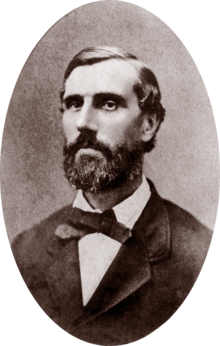Henry Nicholas Greenwell
| Henry Nicholas Greenwell | |
|---|---|

Circa 1867
|
|
| Born |
9 January 1826 Lanchester, County Durham, England |
| Died | 18 May 1891 (aged 65) Kealakekua, Hawaii |
| Nationality | English |
| Occupation | Merchant, Rancher |
| Known for | Kona coffee |
| Spouse(s) | Elizabeth Caroline Hall |
| Children | 10 |
Henry Nicholas Greenwell (9 January 1826 – 18 May 1891) was an English merchant credited with establishing Kona coffee as an internationally known brand. His family became major land-holders in the Kona District of the island of Hawaiʻi. The Greenwell Store is now a museum and historical center.
Henry Nicholas Greenwell was born 9 January 1826 in Lanchester, County Durham, England. His father was William Thomas Greenwell (1777–1856) and mother was Dorothy Smales (1789–1871). His oldest brother was William Greenwell (1820–1918) an English archaeologist who became canon at Durham Cathedral. His sister Dorothy (1821–1882) published poetry under the name Dora Greenwell. He had two other older brothers Francis Greenwell (1823–1894) and Alan Greenwell (1824–1914). As fourth son he had little chance of inheriting the family estate called Greenwell Ford. He attended Durham School and Royal Military Academy Sandhurst expecting a military career.
In 1844 Greenwell purchased a commission as a Lieutenant in the 70th Regiment of the British Army which was stationed in Ireland during the great Famine. He became disenchanted, sold his commission in 1847 and on 15 March 1848, left for Melbourne, Australia. Arriving in June 1848, he traveled to Sydney looking for a sheep or cattle station, but came instead to California in 1849 for the California Gold Rush. When the ship arrived in San Francisco, the crew immediately left and headed for the gold fields, leaving him with goods he intended to sell. After injuring himself unloading, he sailed to the Hawaiian Islands in January 1850 to recover. After a brief time in Honolulu working at the H. J. Holdsworth store, he moved to Kailua-Kona, and opened his own retail store in the Kona District in late 1850.
...
Wikipedia
